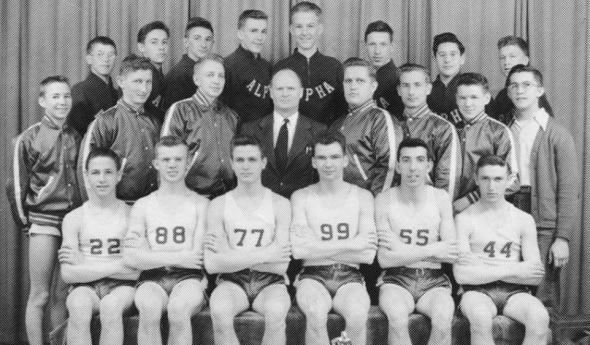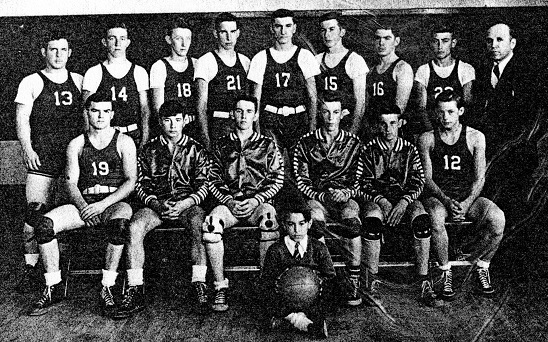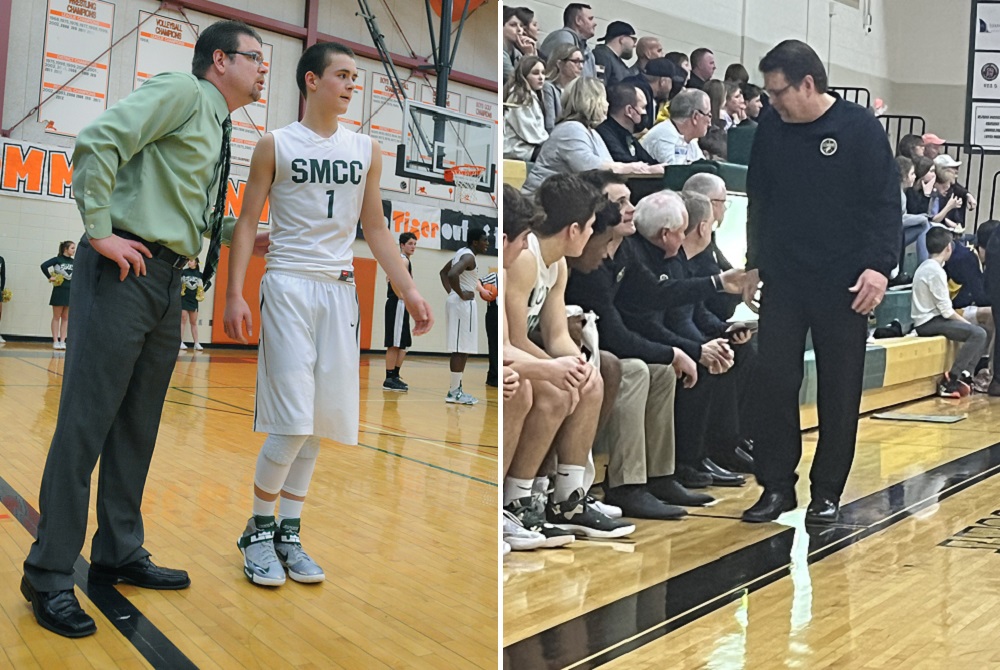
Before the Bridge: Class E & the UP
July 31, 2017
By Ron Pesch
MHSAA historian
This is the final part in a series on MHSAA tournament classification, past and present, that has been published over the last two weeks and originally ran in this spring's edition of MHSAA benchmarks.
The stories are worthy of the silver screen.
Long lost legends of lore, forgotten by most in the Lower Peninsula of the state of Michigan.
Absurd anecdotes of basketball played behind glass, and out-of-bounds lines painted on walls.
Tales of overlooked places like Trenary and Champion and Doelle and Watersmeet.
This is the story of MHSAA Class E basketball.
From 1932 to 1947, Michigan's Upper Peninsula did not compete in the state-sponsored basketball tournament. Instead, the U.P. held a separate basketball tournament, crowning champions in Classes B, C and D. In 1941, the state added a fifth classification – Class E, comprised of schools with a student body numbering 75 or fewer. A fourth bracket was added to the U.P. tourney.
Following the 1948 season, the Upper Peninsula returned to the state tournament. Winners of the traditional U.P. tourney were pronounced regional champions, and advanced to the state quarterfinals in Classes B, C and D. However, since there were no Class E schools with basketball teams in the Lower Peninsula, the winner of the U.P. tournament crown was proclaimed Class E state champion. This arrangement continued through the spring of the 1960 season.
Since they were the state's smallest high schools, the gymnasiums came in all shapes and sizes. Some sported a center circle that intersected with the top of the key. Basketball courts that doubled as a stage required netting to keep the kids and the ball on the court and away from the audience seated below.
Fred Boddy, a former coach at Champion, recalled his first visit to Doelle. Located in copper country near Houghton, the hosts were the proud owners of “the smallest” gym in U.P.
“I couldn't believe my eyes. ... Here on the second floor were windows and bleachers all around filled with fans. The gym, of course, was located on the first floor, but to get into the gym one had to go around to the back of the school to enter through the boiler room to the locker rooms, which opened onto the gym floor much like a dugout on a baseball field. The players sat on a bench under the wall and could look out and see the game in this manner. The free throw lines intersected and there were no out of bounds lines... the wall itself was ‘out of bounds.’ On the floor during the game were 10 players and two referees. There were no sounds as all the fans were up on the second floor, glassed in.
The cheerleaders tried valiantly to fire up the fans up on the second floor, but the teams couldn't hear in the quiet below. The score clock and statistician personnel were placed in a corner box high over the floor in one corner of the gym. They attained this lofty perch by a ladder that was removed from the trap door after all three were in position and the game could thus commence. The timer then tied a rope around his ankle. To send a sub into the game the coach would send the player along the wall heading for this rope. He would pull the rope causing the timer to look down through the trap door and at next opportunity would ring the buzzer and admit this substitute”
Regardless of the challenges presented by these cracker-box gyms, the fans loved their basketball. “The enthusiasm was just the same, if not bigger, than schools twice and 10 times their size,” noted longtime U.P. historian, Jay Soderberg.
Coach Joseph Miheve's 1941 Palmer squad captured the state's first Class E title with a 39-28 win over Hulbert at Ironwood. A graduate of Wakefield High School, Miheve had never played high school basketball, serving as the team's manager.
The 1942 tournament, scheduled for March 19-21, was postponed one week because the city of Marquette was more or less taken over “by nearly 1,000 selective service registrants from every county in the Upper Peninsula” who had another and more serious battle in mind – World War II.
Palmer, this time coached by Elvin Niemi, repeated in Class E with a 37-31 victory over Bergland. It was Palmer's 32nd consecutive victory.
No tournament was held in 1943 due to the involvement of the United States in the war. In the 1944 championship game, Cedarville jumped out to a 19-14 first quarter lead but was held to 24 points in the remaining periods and fell to Amasa, 51-43 at Ishpeming.
Trenary made its lone Class E finals appearance in 1945, losing to Bergland 49-39 at Ishpeming, while the Alpha Mastodons won their first U.P. title since 1934 with a 48-28 win over Champion in 1946. It was the second of five Class E titles for Alpha coach Gerhardt “Gary” Gollakner, one of the finest coaches to come out of the U.P. Gollakner had coached at Amasa two years earlier, and his Mastodons would earn three additional titles during the 19-year run of the Class E championships.
Bergland became the tourney's second two-time winner in 1947, with a 40-37 win over the Perkins Yellowjackets. Perkins made four trips to the Class E finals over the years, including an appearance in the final year of the tournament, but came away empty-handed each time.
The Nahma Arrows made their first appearance in the championship in 1951, losing to Michigamme. Led by coach Harold “Babe” Anderson, a cage star at Northern Michigan College during the early 1940s, the Arrows returned to the finals in 1952. Nahma finished the year with a 21-0 mark and a 64-44 win over Marenisco for the crown.
 The two teams met again in a finals rematch the following year. The scored was tied six times, while the lead changed hands seven times in this barnburner. With 15 seconds to play, Nahma led 64-60. Marenisco's Robert Prosser hit a jump shot, then teammate Bill Blodgett stole a pass and scored to knot the game at 64. With two seconds remaining, Nahma's Bernard Newhouse was fouled. Newhouse hit the first free throw, but missed on the second. Teammate Wendell Roddy tipped in the rebound, and the Arrows had their second title.
The two teams met again in a finals rematch the following year. The scored was tied six times, while the lead changed hands seven times in this barnburner. With 15 seconds to play, Nahma led 64-60. Marenisco's Robert Prosser hit a jump shot, then teammate Bill Blodgett stole a pass and scored to knot the game at 64. With two seconds remaining, Nahma's Bernard Newhouse was fouled. Newhouse hit the first free throw, but missed on the second. Teammate Wendell Roddy tipped in the rebound, and the Arrows had their second title.
Alpha returned to the championship circle in 1954 with a 52-48 win over Perkins.
The 1955 title game matched a pair of the finest teams in Class E history. Trout Creek, making its first championship appearance, downed Alpha 84-83 in another Class E thriller. Don Mackey led the winners with 39 points. Tony Hoholek paced Alpha with 31, while junior John Kocinski added 21-points for the Mastodons.
Kocinski, a four-year starter at Alpha, scored 1,782 points during his career, then an all-time U.P. record. He once scored 51 points against Amasa, and could have scored more according to teammate Walter “Slip” Ball. “He refused to shoot in the fourth quarter, and passed up one shot after another,” Ball said.
Without question, Trout Creek was one of the powerhouse squads during the final years of the tourney. The Anglers, coached by Bruce “Pinky” Warren, a former captain of Purdue's football team, made four trips to the finals during the last six years of the Class E tourney. The defending champions downed Alpha in the semifinals of the 1956 tournament, then knocked off Hermansville 86-68 in the finals to repeat. It was a year of celebration for fans of U.P. basketball, as four of the state's five champions – Stephenson (B), Crystal Falls (C), Chassell (D) and Trout Creek (E) – came from Michigan's northern peninsula.
Hermansville returned to the finals in the spring of 1957 and earned its second Class E title with a 77-51 win over Michigamme at Escanaba. Trout Creek downed Perkins 61-41 for their third crown in 1958.
The 1959 championship, hosted at Northern Michigan College's fieldhouse, was a showdown of the U.P.’s only undefeated squads, Trout Creek and Nahma. Trout Creek was riding a 24-game winning streak that dated back to the 1958 season. A scoring machine, Warren's Anglers averaged 81.7 points per contest. Nahma, 19-0 on the season, boasted the U.P.'s strongest defense. Still coached by “Babe” Anderson, the Arrows had allowed an average of 38.2 points per game. Led by senior Warren Groleau, Nahma had been last defeated by Trout Creek in the semifinals of the 1958 tourney.
Leading 25-15 at the intermission, Nahma matched Trout Creek point for point in the second half for a 55-45 victory.
Hermansville, behind Richard Polazzo's 29 points and Irwin Scholtz's 27, downed surprise finalist Perkins 72-50 in the 1960 finale, to end this chapter in MHSAA history.
Today, most of the former Class E high schools are long gone. Many have closed their doors and consolidated with other area schools. Amasa and Alpha merged with Crystal Falls to form Forest Park. Palmer is now part of the Negaunee school system. Bergland and Trout Creek joined forces with Class D Ewen to form Ewen-Trout Creek. Hermansville combined with Powers to form North Central, to name but a few. A few remain: Dollar Bay, Marenisco (now Wakefield-Marenisco) and Watersmeet, and their enrollments are much the same as in the glory days of the state's fifth classification.
Author’s note: Special thanks to Jay Soderberg and Roger Finlan, who assisted in gathering statistics and quotes used in this article. Thanks also to Dick Kishpaugh, Bob Whitens, Walter “Slip” Ball, Dennis Grall, Fred Boddy, Bruce Warren, Gene Maki, Harold “Babe” Anderson and the various personnel at U.P. high schools for their contributions to this story.
PHOTOS: (Top) The Alpha boys basketball team won the 1950 Class E title by nearly doubling up Michigamme, 52-28. (Middle) Hermansville claimed the 1948 title with a 58-38 win over Rockland.

Baseball Pro Windham Winters at Monroe St. Mary as Dad's Assistant Coach
By
Doug Donnelly
Special for MHSAA.com
December 15, 2022
When Bryce Windham was about 6 years old, he was the ball boy for the Monroe St. Mary Catholic Central basketball team.
 At halftime, rather than go inside the locker room, Bryce would stay on the court and shoot 3-pointers.
At halftime, rather than go inside the locker room, Bryce would stay on the court and shoot 3-pointers.
“He was the halftime entertainment,” SMCC head boys basketball coach Randy Windham said. “I’d hear some big cheers, and I’d open the door and look out and just shake my head. Bryce would be out there shooting 3s.”
Bryce is now 26 and a minor league baseball player in the Chicago Cubs organization. Being a professional baseball player hasn’t changed who he is or where he is. Only now, Bryce goes into the locker room because he’s an assistant coach for his dad’s SMCC Falcons.
“He’s ready right now,” Randy Windham said. “He could be head coach right now. I tell him, ‘Once you are done messing around with the baseball thing, you can coach this team.’”
Bryce had a dream high school sports career at SMCC.
He was the Falcons’ starting shortstop, point guard on the basketball team, and was quarterback for the football team. He was all-state in all three sports. He quarterbacked SMCC to the 2014 Division 6 championship in football. The Falcons boys basketball team – coached by his dad – reached the 2015 Class C Quarterfinals. He was MVP of the 2015 all-star baseball game at Comerica Park.
“He’s always been a thinker, no matter what sport he’s been in,” Randy Windham said. “He’s always analyzed the game. That helps. He’s so humble. That’s the best thing about him.”
Bryce could have played basketball at the University of Toledo, but took a different turn when Old Dominion University offered him a baseball scholarship.
“I was nowhere’s near as good at baseball as I was at basketball,” he said. “I didn’t think I was very good. I wanted to see how good I could be at baseball.”
The lure of Virginia Beach, Va., helped push him to baseball, too. It was a couple of years into baseball on the east coast that he picked up catching. After graduating, he ended up getting drafted by the Cubs and is now at the Double A level.
Bryce reports back to the Cubs on Feb. 17. He expects to return to the Tennessee Smokies, where he played last season.
 “Double A is where the prospects are. Players are competitive, pushing hard,” he said. “I think they really want me to get some at-bats and get more miles catching on my body.”
“Double A is where the prospects are. Players are competitive, pushing hard,” he said. “I think they really want me to get some at-bats and get more miles catching on my body.”
For now, in Monroe, he works out daily to stay in shape, hits the batting cages to keep his swing sharp and works at the family business. He will leave for baseball just at the time SMCC begins final preparations for the District tournament, and he’s okay with that.
“By then, the teaching is done,” he said.
It’s no shocker that Bryce is coaching in his spare time. Not only is his dad an ultra-successful boys basketball coach at SMCC, but his mom Kim also has had great success coaching volleyball in Monroe County for years. As soon as Bryce’s high school career was finished, he started to coach.
“I started helping right after I graduated high school,” Bryce said. “In college, I’d come home, and I’d practice with the guys. That allowed me to stay in shape, and I kind of kept the relationship with guys. Once I officially graduated from college, I jumped right into coaching.”
“I always felt like a player-coach when I played,” Bryce continued. “I felt like I knew what was going on, even outside of myself.”
Coaching just came naturally.
“I knew that was something I wanted to do. It’s because of him,” he said, pointing to his dad. “He was my coach from fifth grade all the way up. I knew the game. I tell my pitching coach all the time that if my baseball IQ was as high as my basketball IQ, I’d be in the Major Leagues right now.”
Randy Windham is in his 14th season as the SMCC varsity coach. He took over for longtime coach Ray Lauwers and built on that success and brought the Falcons to new heights, with multiple deep runs in the postseason. He came into this winter with a record of 229-71. A lot of those wins came with Bryce on the court. Another victory during his tenure actually belongs to Bryce as coach.
Randy was ill last year and, for the first time in nearly three decades of coaching, he sat out a game. Bryce took the reins and led SMCC to a Huron League win at Milan.
“I was so nervous,” Bryce said. “I’m glad it was on the road. If it would have been at home with all the home fans, I would have been more nervous.”
Randy said he was comfortable with missing the game because he knew Bryce would be fine.
“I give him a lot of responsibility now,” Randy said. “He’s ready right now to be a head coach. He’s ready for that. Coaches must do more than Xs and Os. A coach must be able to handle problems before they happen. He’s ready for that. I can walk away from practice, and he can handle it.”
“He just knows the game so well. I know for a fact that I could step away, and the success would continue. He’s natural at it.”
Windham said having his son on the bench next to him provides a lot of comfort, and the players like having him there. Bryce rarely talks about being a professional baseball player, but that gets the attention and respect of the players right away.
“He’s helped me come back,” Randy said. “I’ve been around here 25 years (including his time as an assistant to Lauwers). He helps refresh me. In the fall, he comes back and jumps right into the skill work with the kids. That allows me to refresh and have the energy to coach this time of year. I love this time of year.”
For now, Bryce will continue to pursue professional baseball but knows coaching is in his future at some point.
“I’m still an athlete and a coach. Right now, I kind of have that bridge between the players and (my dad). I keep them out of trouble. I catch things before he catches it. I bring a lot of energy to practice every day. Basketball practice is so much fun,” Windham said.
He also has a different perspective now as an assistant coach, but one he relishes. As he said, again referring to his father, “I only know what I know because of him.”
 Doug Donnelly has served as a sports and news reporter and city editor over 25 years, writing for the Daily Chief-Union in Upper Sandusky, Ohio from 1992-1995, the Monroe Evening News from 1995-2012 and the Adrian Daily Telegram since 2013. He's also written a book on high school basketball in Monroe County and compiles record books for various schools in southeast Michigan. E-mail him at [email protected] with story ideas for Jackson, Washtenaw, Hillsdale, Lenawee and Monroe counties.
Doug Donnelly has served as a sports and news reporter and city editor over 25 years, writing for the Daily Chief-Union in Upper Sandusky, Ohio from 1992-1995, the Monroe Evening News from 1995-2012 and the Adrian Daily Telegram since 2013. He's also written a book on high school basketball in Monroe County and compiles record books for various schools in southeast Michigan. E-mail him at [email protected] with story ideas for Jackson, Washtenaw, Hillsdale, Lenawee and Monroe counties.
PHOTOS (Top) At left, coach Randy Windham and his son/point guard Bryce Windham confer during Monroe St. Mary’s Regional run in 2014. At right, Randy talks things over this season with Bryce, now his assistant coach. (Middle) Bryce Windham mans the plate this summer for the Tennessee Smokies, a Cubs affiliate. (Top photos by Tom Hawley and Doug Donnelly, respectively. Middle photo by Mike Krebs.)

